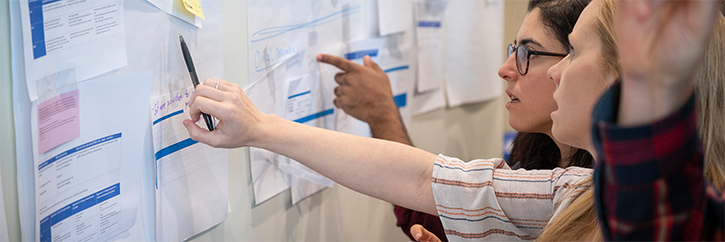Catalyst Fellowship Phase 2 Pilot program
“Veterans have given us everything we asked for and everything they can give. It’s our duty as healthcare providers to honor that with everything we can give back—including innovating ways to make the care we provide better and more accessible.”
2021 Veterans Health Administration (VHA) Innovation Entrepreneur in Residence and Chief of Innovation at Tampa VA Medical Center, Indra Sandal knows first-hand what innovation in healthcare looks like and requires. Collaborating with the Catalyst Program at MIT linQ, in the MIT Institute for Medical Engineering and Science (IMES), since 2021, Dr. Sandal, MIT catalyst faculty and Innovation Advisor and her colleagues in the VHA’s Innovation Ecosystem have leveraged expertise across the MIT community and broader Boston innovation network to accelerate and heighten the impact of innovation for Veterans’ health. A recently completed pilot program for emerging biomedical technologies demonstrates what the collaboration can accomplish.
Aligning people from IMES, MIT InnovationHQ, and the MIT and greater Boston community, Catalyst is a multiphase program that aims to break down expertise silos and bring together a diverse network of experts and innovators from fields that rarely intersect. This convergence of talent fosters an environment where groundbreaking ideas are not only explored but rigorously investigated and refined. By merging academic excellence with real-world insights from VHA, the goal of the Phase 2 pilot program was to de-risk and accelerate projects poised to revolutionize healthcare.
“Our collaboration with the VHA, since its start in 2019, has given us tremendous opportunity to bring to bear the best scientific and engineering talent on Veterans’ urgent health needs, from the impact of traumatic injuries to persistent mental health threats,” said Martha Gray, MIT Whitaker Professor in Biomedical Engineering and Director of MIT linQ, which operates the Catalyst Program. “Working with the VHA, we are enabling native innovation in the clinical centers where caregivers can see the need clearly, but don’t have the time or resources to act. Indra and the VHA Innovation Ecosystem team have been dedicated since day one of our collaboration to overcome those limitations.”
“This is an ideal program for IMES,” said Alex Shalek, J. W. Kieckhefer Professor in the Institute for Medical Engineering and Science, who became IMES director in August. “It demonstrates how critical collaboration is in translating research and discovery to clinical care, and I’m proud to lead a team with such broad and deep partnerships.”
The recently completed MIT catalyst Fellowship Phase 2 pilot program demonstrated how projects emerging from the Catalyst process with a validated need and solution (Phase 1) can transition to building and testing their technologies (Phase 2). A robust support framework was developed with Catalyst faculty playing a crucial role in cultivating high-performing teams.
Through intensive mentorship, these teams were guided in executing milestone-driven strategies with evaluation via both internal and external reviews. Strategic vision and funding, enabled by Dr. Sandal through the Tampa VA Medical Center and the VHA Innovation ecosystem, played a vital role in the development of prototypes and fostering key collaborations. This structured approach has enabled team members—working part-time from diverse locations across the United States—to achieve significant progress in their projects. This model demonstrated a scalable and replicable framework for institutions committed to advancing innovation in health technology.
The pilot also leveraged lessons from a previous initiative Dr. Sandal led, VHA-Uber Health Connect which improved Veteran access to care. It too has grown from targeted pilot programs to a nationally expanding service.
“In Phase 2 of Catalyst, promising biomedical technology innovation ideas find their footing,” said Ravi Rasalingam, former VHA Innovation Entrepreneur in Residence who chairs the Phase 2 Operating Committee. “As a former Catalyst Fellow and now Faculty member, I know both the opportunities and the challenges of bringing ideas to reality. The Regional Pilot support has proven transformative in getting much-needed healthcare solutions closer to mainstream adoption.”
Three teams advanced through to the Phase 2 regional pilot:
- The SLEEP–Post Traumatic Stress Disorder (PTSD) team uses sleep data from wearable devices to enhance treatment for Veterans with PTSD, aiming to improve therapy adherence and to reduce suicide risk.
- The Critical High-Risk Psychosis (CHiRP) team is developing a large language model (LLM) that can identify changes in speech predictive of psychosis development. Many psychotic disorders are difficult to detect early, so they miss treatments that can prevent or mitigate progression.
- The Pressure Injury-Microclimate (PI-MC) team is fabricating a sensor-based mat for beds to allow pressure ulcers detection and prevention at home. For spinal cord injuries, pressure ulcers are a significant cause of morbidity resulting in frequent hospitalizations.
“In Phase 2 we made important progress on our technology development, and planned our Proof of Concept study, including securing IRB approval,” said Dr. Bajor, who leads the Sleep-PTSD project. “Given the complexity of our objectives, it feels like we just completed two years of work in nine months. The structure and support we received catapulted us forward.”
David Dunning, Executive Director, Tampa VA Medical Center is a member of the Phase 2 Pilot Program Steering Committee. “The ultimate outcome is to get a lot of people excited about what we are building,” he said, “and show them this model of accelerating healthcare innovation can be replicated at other sites, by those really interested in making a difference in Veteran healthcare.”
“Veterans will benefit when these technologies succeed,” said Kristopher “Kit” Teague, Executive Director, VHA Innovation Ecosystem and another member of the steering committee. “We are forging a powerful alliance between two dedicated communities to revolutionize healthcare for Veterans. The Regional Pilot marks a significant milestone in our journey to deliver exceptional care and transformative solutions.”
The collaboration between MIT IMES and the VHA brings together major healthcare innovation opportunities with global innovation leaders. “The rigor of the work, involvement of diverse talent, and relentless focus on Veterans’ healthcare needs found in Catalyst is unlike anything in the country today,” said Dr. Sandal, co-chair of the Phase 2 Pilot Program Steering committee “Our successful pilot demonstration gives me great confidence we can fulfill our promise to deliver the innovation Veterans deserve.”



